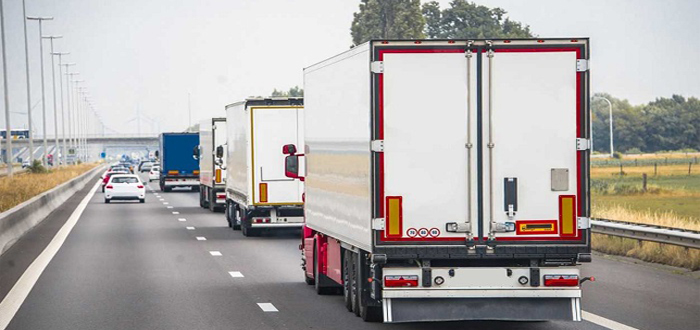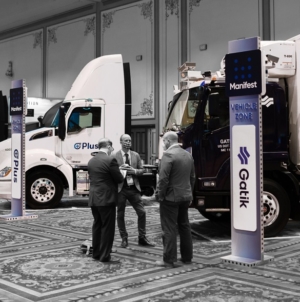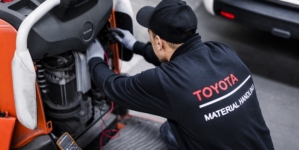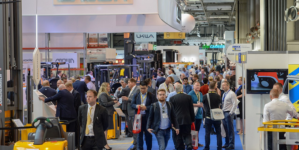-
Sparck Technologies awarded Royal designation - March 27, 2025
-
OpenADR Alliance announces first OpenADR 3.0 certified products with EVoke Systems, E.ON Energy and Universal Devices - March 25, 2025
-
Growing fulfilment and contract packer appoints new Managing Director - March 25, 2025
-
When is it time to invest in a WMS? Understanding the key trigger points - March 25, 2025
-
eCapital helps Vantage Recruitment on its journey to financial success - March 24, 2025
-
Hugo Beck Celebrates 70 Years of Packaging Innovation with Open House Events - March 20, 2025
-
PROLOG FULFILMENT SUPPORTS LUNA DAILY’S COMMITMENT TO BETTER BODY CARE FOR ALL WOMEN - March 19, 2025
-
Motion Ventures launches largest-ever maritime tech fund at $100M to meet the industry’s new pace of adoption - March 18, 2025
-
ITD GLOBAL APPOINTS GROUP CHIEF REVENUE OFFICER - March 17, 2025
-
SURECAM TEAMS UP WITH ENTERPRISE FLEX-E-RENT FOR VEHICLE REPAIR & MAINTENANCE CONFERENCE - March 14, 2025
New projects look at the future of carbon emission reductions in commercial fleets and freight.
“What role can vehicle-to-grid and electrification play in freight?” asks Heriot-Watt University and Flexible Power Systems
Heriot-Watt University and energy systems company Flexible Power Systems (FPS) have been awarded two Government grants to explore how vehicle technologies could evolve to reduce emissions in the commercial and freight sector.
The first project ‘Integrated Energy Systems for Commercial Vehicles’ will assess the technical challenges and business models related to vehicle-to-grid technology (V2G) adoption among commercial vehicle operators.
As well as reducing greenhouse gas emissions while in transit, electric vehicles have the potential to return stored energy in their batteries back to the grid when parked. This is particularly relevant to commercial vehicles, which have predictable operating patterns and congregate in large numbers at depots, meaning that larger quantities of firm power could be available from these areas. However, these vehicles also have demanding operating constraints that must be met.
While a number of V2G projects have already focused on passenger vehicles, little activity has addressed the commercial sector. Despite accounting for less than 13% of vehicles on the road, HGVs, light vans, buses and coaches contribute to 34% of the UK’s total transport related CO2 emissions. Globally, HGVs contribute 7% of emissions and impact air quality with approximately 39% of NOx emissions.
The project is part of a £30 M UK-wide package of competition funding to help develop the technology and business case for V2G charging. Funding is being provided by the Office for Low Emission Vehicles (OLEV) and the department for Business Energy and Industrial Strategy (BEIS), in partnership with Innovate UK.
The second project ‘Up-Featured Trailers for Future Logistics’ will assess future operator vehicle needs in the context of evolving town centre access and emissions constraints. As part of the project, the feasibility of an advanced trailer design using an optimum mix of energy storage, light-weighting and connectivity technologies to address these challenges will be undertaken. The project will be delivered in partnership with Lawrence David, one of the leading trailer manufactures in the UK.
Heriot-Watt University’s Professor Phil Greening is Deputy Director of the Centre for Sustainable Road Freight, a joint initiative with Cambridge University, which is involved in the research.
Professor Greening explained: “The future strategy for low-emission freight is still being developed. Decarbonisation, air quality and changes in energy and communications technologies are all impacting the sector. Commercial vehicles represent a unique challenge for options like electrification because of their need to carry payloads across demanding duty cycles for a very cost sensitive customer base.
“In the project ‘Integrated Energy Systems for Commercial Vehicles’, we want to understand the maximum contribution that V2G can make to commercial vehicle economics within the constraints of real-world operations. To do this, we are bringing together the customers, energy systems thinking, technologies, operational and network perspectives to synthesise a holistic view.
“In the second project, ‘Up-Featured Trailers for Future Logistics’, we want to understand how the back bone of the industry – articulated trailers will need to evolve in a changing world. The design developed will benefit from testing in a virtual environment built to mimic end user duty cycles.”
Heriot-Watt University and FPS will be working with industry representatives from the Freight Transport Association, Society of Motor Manufacturers and Traders and Energy Managers Association to ensure the research has real world application and relevance. Policy and system level perspectives are being provided by the Transport Systems Catapult and Transport Scotland.
Michael Ayres from Flexible Power Systems continued: “Unlocking the energy storage potential in electrified commercial vehicles will be complex. We need to join the dots on vehicle and charger technology, electricity generation and network demand as well as the evolving requirements of the customer base. Flexible Power Systems’ business is all about unpicking complexity for our customers and translating it into actionable insights and we are looking forward to combining this with Heriot-Watt University’s deep knowledge of the commercial vehicle and freight sectors.”
Professor Toby Peters, Senior Research Fellow in Transformational Innovation for Sustainability at Heriot-Watt University will chair the advisory panel. Professor Peters concluded: “Our energy and transport networks are rapidly changing at a time when they are becoming more closely integrated. By bringing a systems approach to areas like freight, we have the potential to transform them and the impact they have on our planet and society for the better. Maximising the value streams available from electric vehicles is essential if they are to have a chance of succeeding in the commercial vehicle sector.”
































